Quitting a job can be a difficult decision, but it’s important to handle it professionally. A two-week notice letter, also known as a resignation letter, serves as a formal way to inform your employer of your intentions to leave the job.
This letter offers a two-week period for a smooth transition and to allow your employer time to find a replacement. Writing a clear and concise two-week notice letter can set a positive tone for your future endeavors and maintain a good professional relationship.
Table of Contents
Two Weeks Notice Templates
Two Weeks Notice Templates are essential tools used by employees to formally communicate their intention to resign from a job or position. These templates provide a structured and professional format for submitting a resignation letter with a standard notice period of two weeks. Two Weeks Notice Templates help employees resign in a respectful and proper manner, allowing employers to adequately plan for their departure and ensure a smooth transition.
Two Weeks Notice Templates ensure that employees resign from their positions in a professional and considerate manner. By utilizing these templates, employees can adhere to the standard notice period and provide their employers with sufficient time to manage the transition effectively. Resigning with a two weeks’ notice allows employers to plan for a replacement, distribute responsibilities, and maintain continuity in operations. Whether used in corporate settings, small businesses, or non-profit organizations, Two Weeks Notice Templates provide a consistent and structured approach to submitting resignation letters, fostering professionalism and maintaining positive relationships between employees and employers.
How Does Two Weeks’ Notice Work?

Two weeks’ notice is a standard amount of time that an employee gives their employer before leaving their job. During this notice period, the employee continues to work their regular hours and fulfill their job duties. The purpose of giving two weeks’ notice is to provide adequate time for the employer to make arrangements for a replacement or to adjust their workflow.
The employee and employer may also use the notice period to discuss any final details and ensure a smooth transition. It’s important to note that while two weeks’ notice is a common practice, it may not be a legal requirement and the terms can vary based on company policy and employment agreement.
Why is it important to give two weeks’ notice?
Giving two weeks’ notice is considered a professional and respectful way to resign from a job. It allows your employer sufficient time to make arrangements for your replacement or adjust workflow. It also demonstrates your commitment to the company and helps maintain a positive relationship with your employer, which can be beneficial for future job references and networking. Additionally, giving a two weeks’ notice may be a requirement specified in your employment contract or company policy.
Is a two-week notice 10 or 14 days?
A two-week notice is typically 14 days, starting from the day you provide notice to your employer. The purpose of giving two weeks’ notice is to provide your employer with a sufficient amount of time to find a replacement or make arrangements for your departure. The exact duration of the notice period may vary depending on company policy or employment contracts.
What Happens After You Give Your Notice?
After you give your two weeks’ notice, the following steps typically occur:
Finish any remaining projects or tasks: During the notice period, you should continue to work diligently and complete any remaining projects or assignments.
Wrap up loose ends: Use this time to tie up any loose ends, such as transferring your responsibilities to a colleague or completing any final paperwork.
Schedule an exit interview: Your employer may schedule an exit interview to discuss your departure and gather feedback about your experience at the company.
Continue to work: You are expected to continue working and adhering to company policies and procedures until your last day on the job.
Final paycheck: On your last day of work, you may receive your final paycheck, which will include any earned but unused vacation or paid time off.
Maintain a positive relationship: Try to maintain a positive and professional relationship with your employer and colleagues, as you never know when you may need to ask for a reference or have a future business opportunity with them.
How to Give a Two Weeks’ Notice ?
Giving a two weeks’ notice can be a difficult and awkward process, but it’s important to do it in a professional and respectful manner. Here is a step-by-step guide on how to give a two weeks’ notice:
Review your employment contract: Before you resign, review your employment contract to understand the notice period and other requirements you need to fulfill.
Schedule a meeting with your supervisor: Arrange a meeting with your supervisor to discuss your resignation. It’s best to do this in person rather than over the phone or email.
Write a resignation letter: Before the meeting, draft a resignation letter stating your intent to leave and the last day you will be working. Keep the letter concise, professional and courteous.
Have the conversation: During the meeting, inform your supervisor of your decision to resign and hand over your resignation letter. Be honest about your reasons for leaving but avoid being negative.
Offer to help with the transition: Offer to assist with the transition and help find a replacement if possible. This will show your professionalism and can help maintain positive relationships with your employer and colleagues.
Confirm the resignation in writing: After the meeting, follow up with a written confirmation of your resignation, including the date you will be leaving and the terms of your notice period.
Wrap up loose ends: During your notice period, complete any outstanding tasks and hand over your responsibilities to your successor. Be sure to also return any company property and clear up any outstanding issues.
Leave on a positive note: End your employment on a positive note by thanking your employer and colleagues for the opportunities and experiences you had while working there. This can help maintain professional relationships for future reference.
Remember, quitting a job is not just about leaving a company but also leaving an impression. Make sure to give your notice in a professional and respectful manner to ensure a positive transition for both you and your employer.
FAQs
Do I have to give two weeks’ notice?
It depends on the terms of your employment contract or company policy. If it is not specified, it is considered a professional and respectful practice to give a two-week notice.
Can I give more than two weeks’ notice?
Yes, you can give more than two weeks’ notice, if you wish to do so. It is a gesture of good faith and can help make the transition smoother for your employer.
Can I resign without giving a two-week notice?
It depends on the terms of your employment contract or company policy. Some companies require a two-week notice, while others may not. If there is no requirement, resigning without a two-week notice is possible, but it may not be considered a professional or respectful move.
What happens if I don’t give two weeks’ notice?
If you don’t give a two-week notice and you are not in breach of your employment contract, your employer may choose to release you from your job immediately or they may choose to pay you in lieu of notice.
Can my employer ask me to leave immediately after I give my two-week notice?
It depends on the terms of your employment contract or company policy. Your employer may choose to release you from your job immediately after you provide your two-week notice, or they may choose to have you work through the notice period.
Can I be terminated immediately after giving a two-week notice?
It depends on the company policy and the agreement between the employer and employee. Some companies may have a policy of terminating employees immediately after they give their notice, while others may allow the employee to work the full two weeks.
Do I have to put my two-week notice in writing?
While it is not legally required, it is always a good idea to put your two-week notice in writing as a way of formally documenting your resignation. This can protect you if there are any disputes about the terms of your departure.
Can I be forced to leave sooner than two weeks after giving my notice?
Your employer can ask you to leave sooner than two weeks after giving notice if there is a legitimate business reason, such as if you have access to confidential information or if your presence in the workplace is disruptive. However, it’s best to discuss this with your employer in advance to avoid any misunderstandings.
Can I change my mind after giving a two-week notice?
Depending on the circumstances, you may be able to change your mind and stay with the company. However, it’s best to discuss this with your employer as soon as possible to avoid any misunderstandings or damage to your professional reputation.
What if I want to resign immediately due to an emergency or other reason?
If you need to resign immediately due to an emergency or other reason, it’s important to communicate this to your employer as soon as possible and to provide as much notice as you can. Your employer may be willing to make arrangements to accommodate your situation.
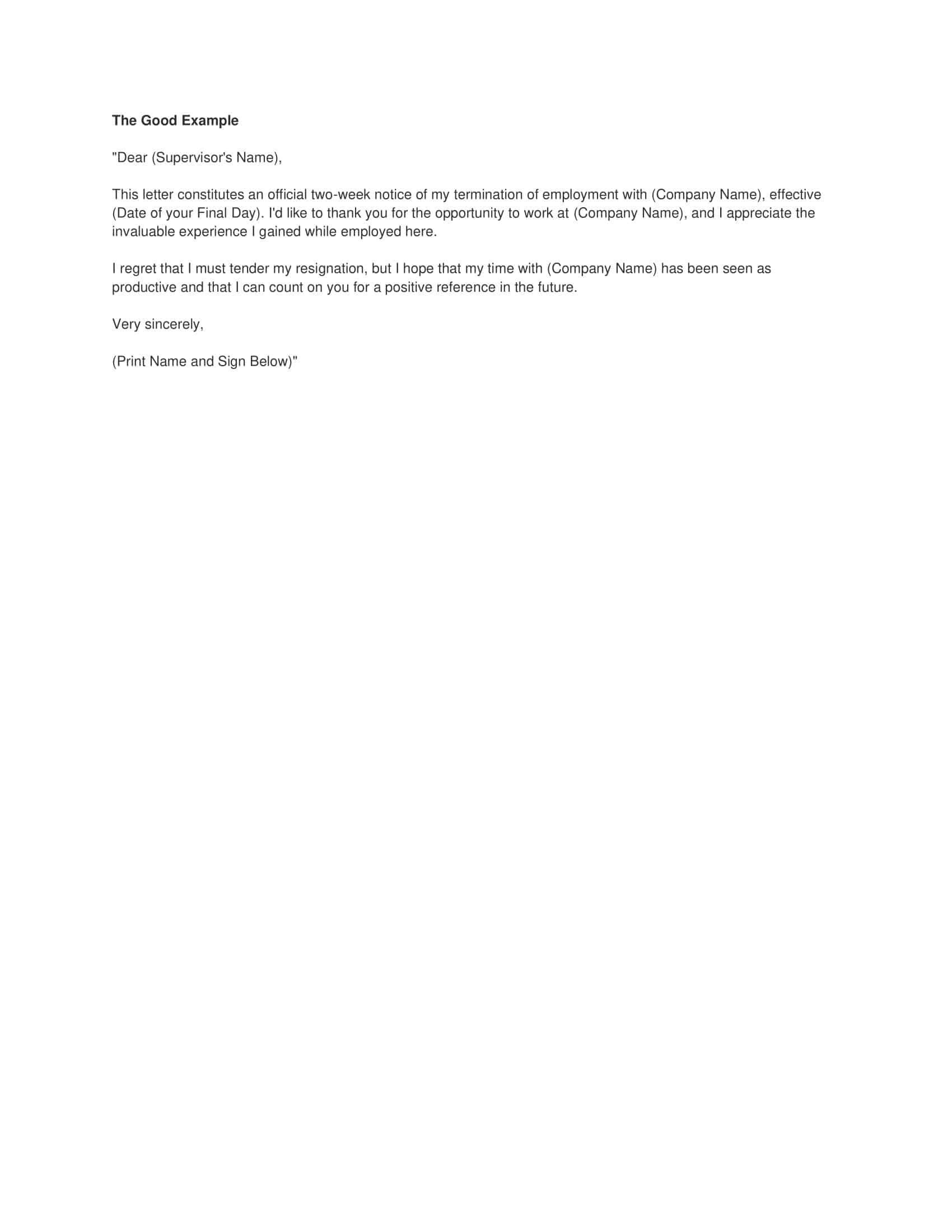










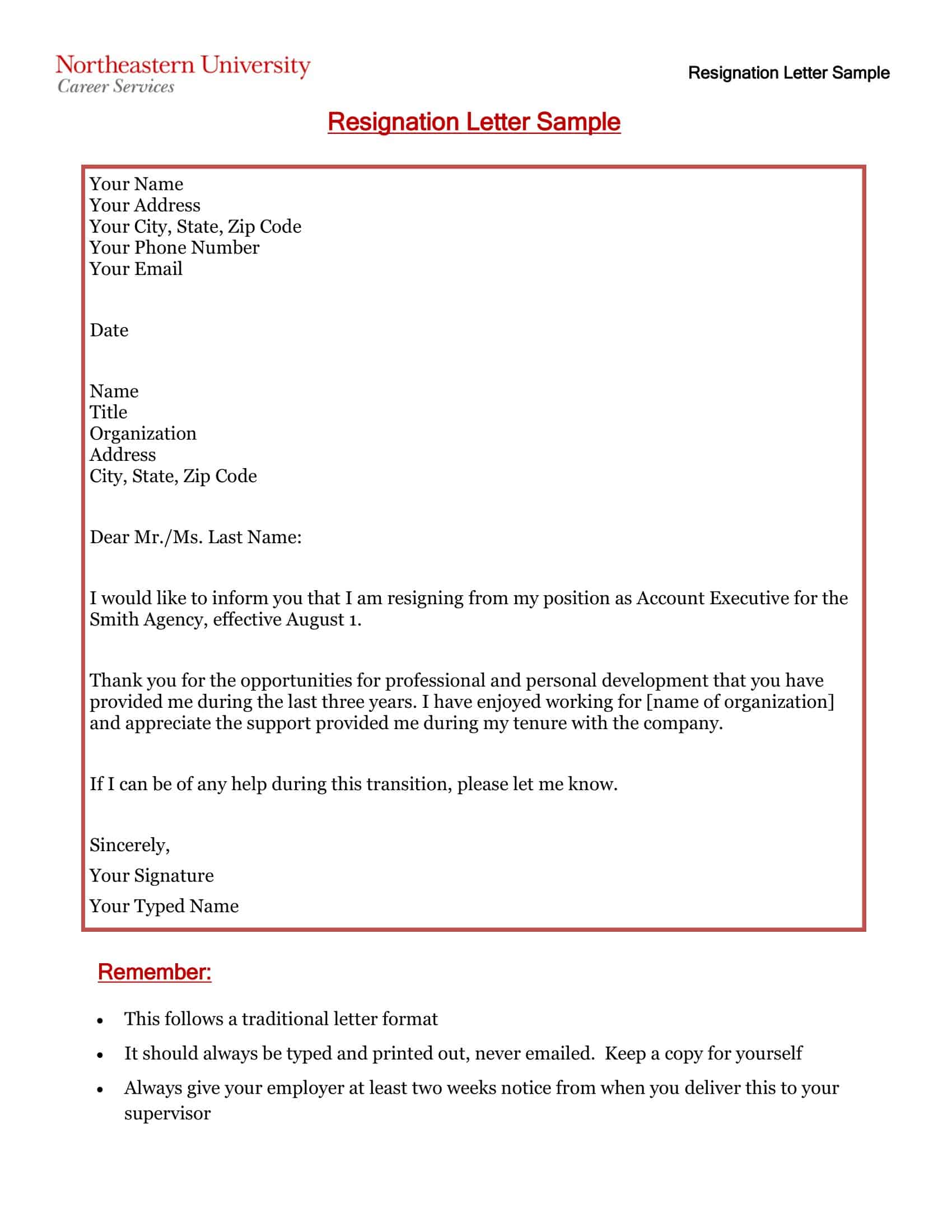














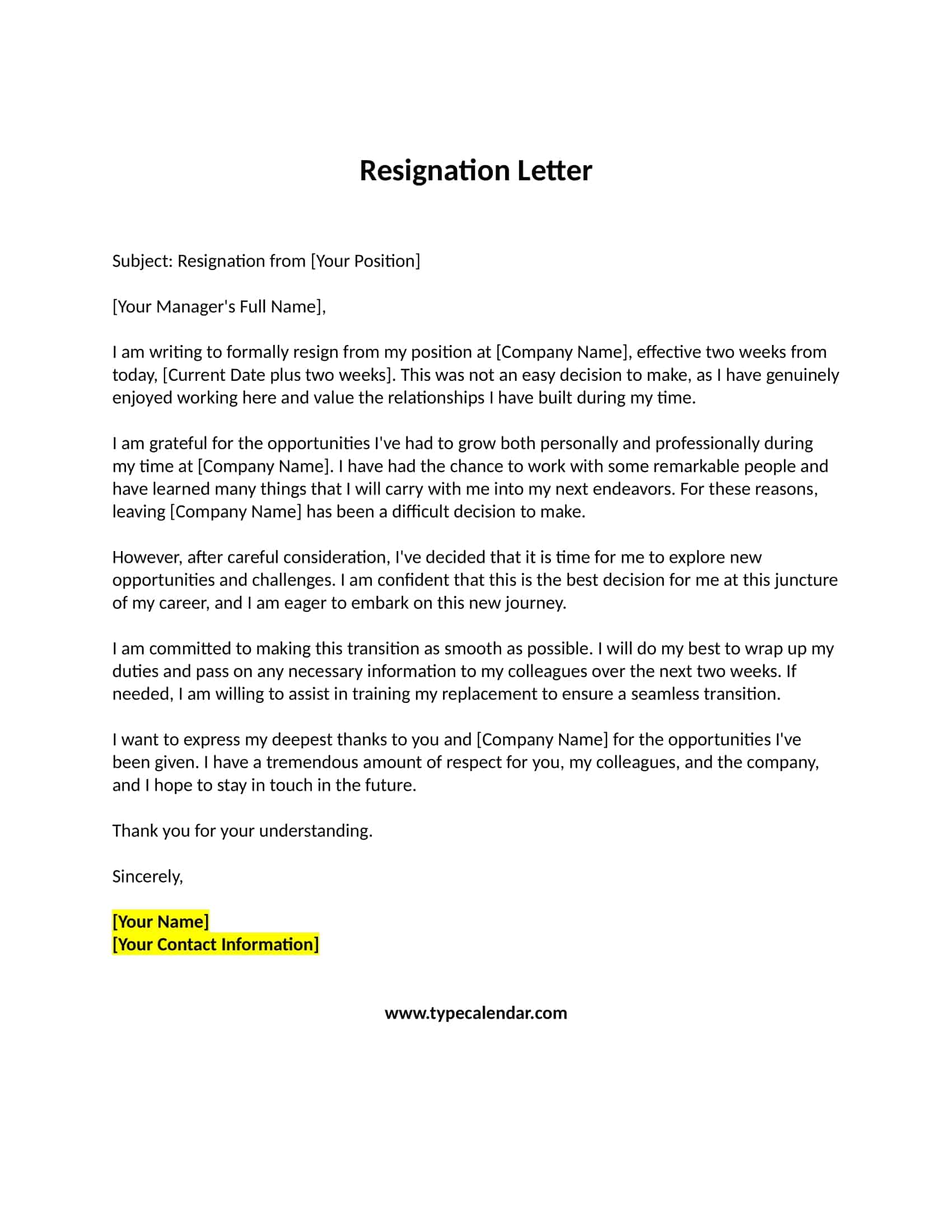


















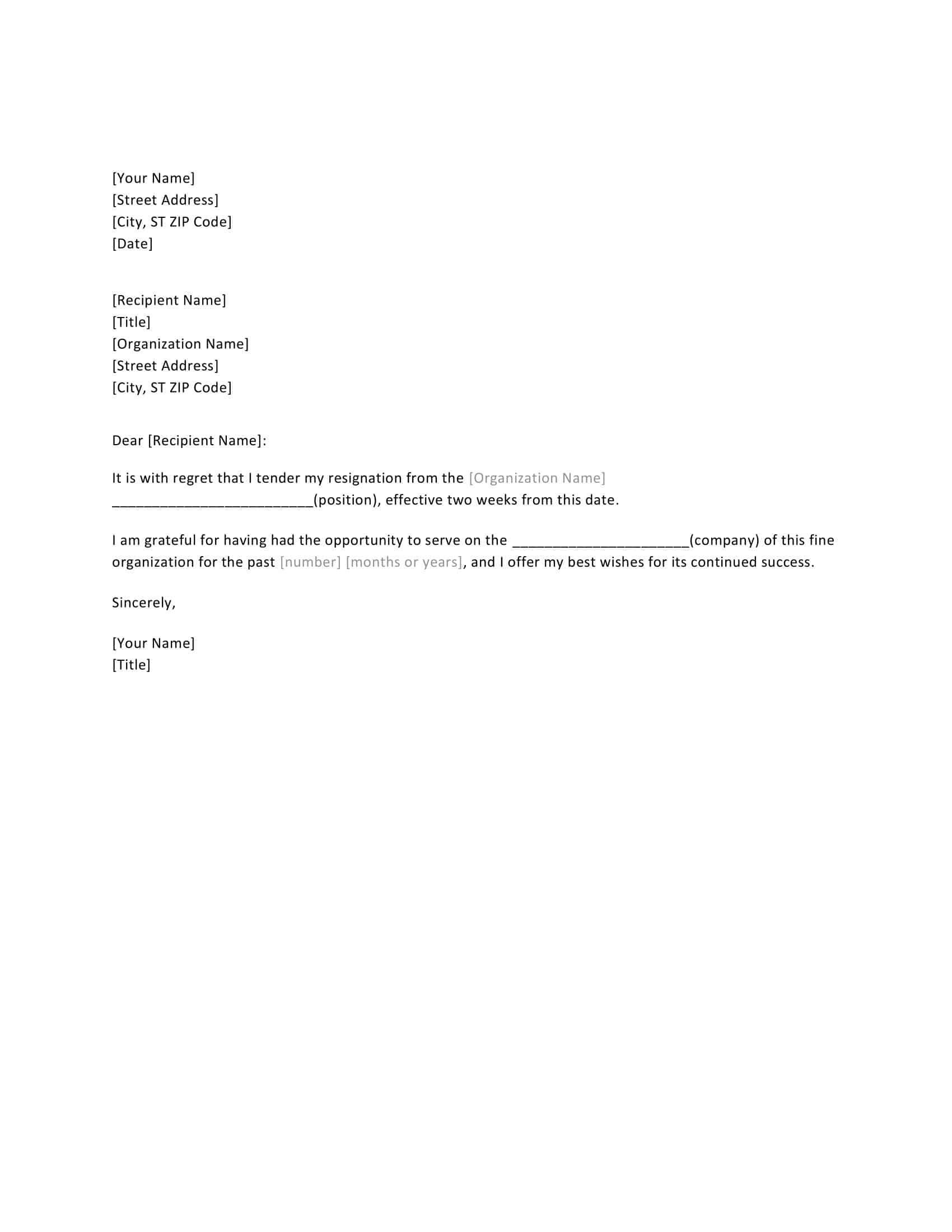


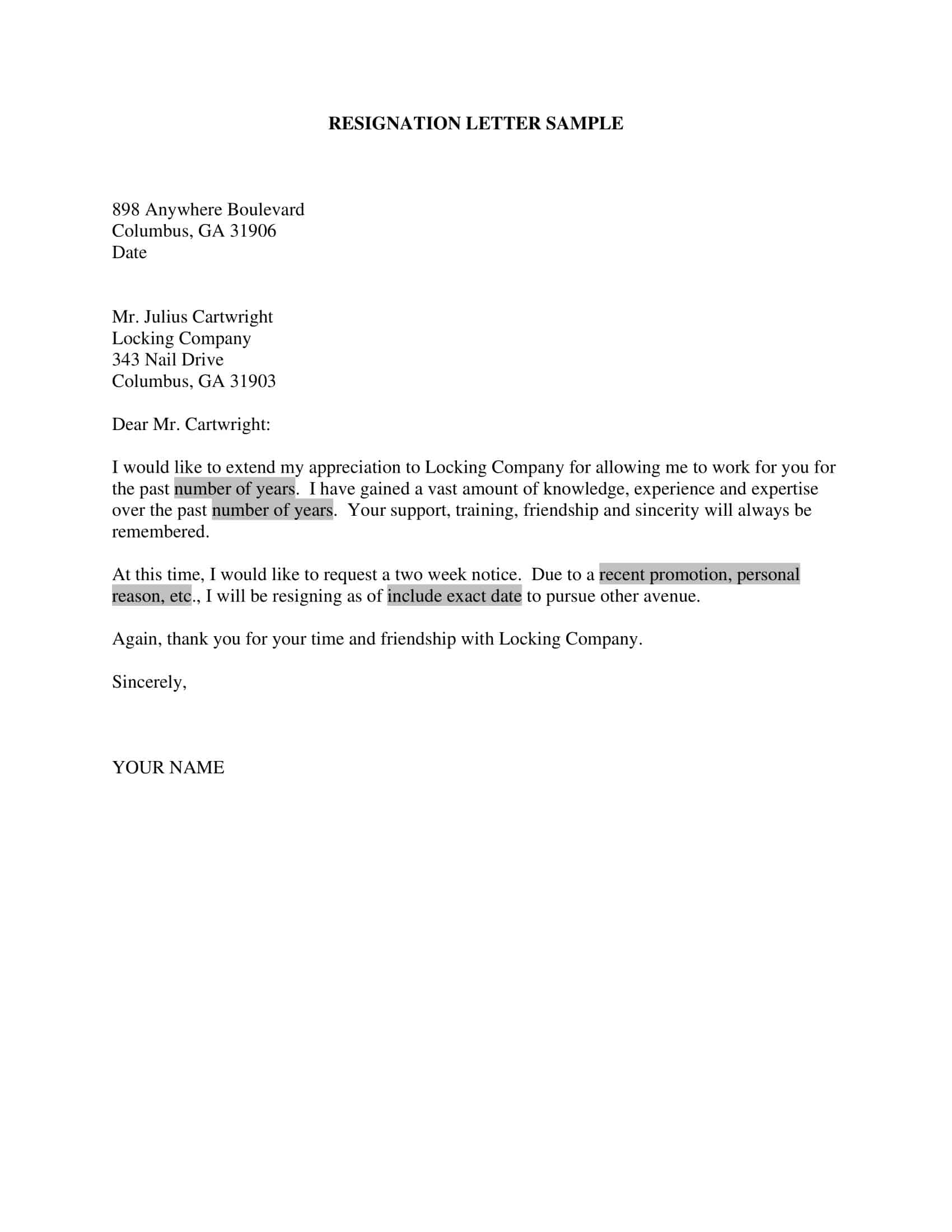

![Free Printable Roommate Agreement Templates [Word, PDF] 1 Roommate Agreement](https://www.typecalendar.com/wp-content/uploads/2023/06/Roommate-Agreement-150x150.jpg)
![Free Printable Credit Card Authorization Form Templates [PDF, Word, Excel] 2 Credit Card Authorization Form](https://www.typecalendar.com/wp-content/uploads/2023/06/Credit-Card-Authorization-Form-150x150.jpg)
![Free Printable Stock Ledger Templates [Excel,PDF, Word] 3 Stock Ledger](https://www.typecalendar.com/wp-content/uploads/2023/08/Stock-Ledger-150x150.jpg)
